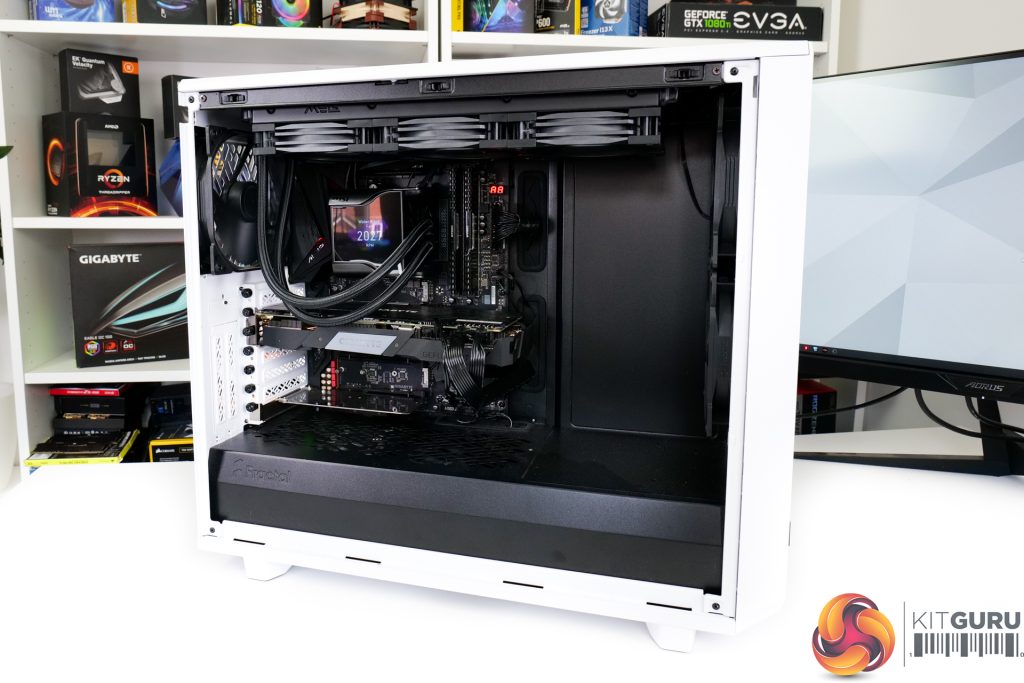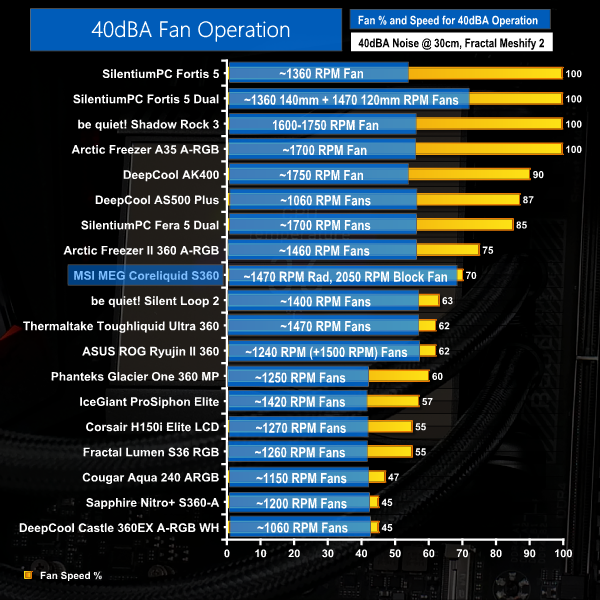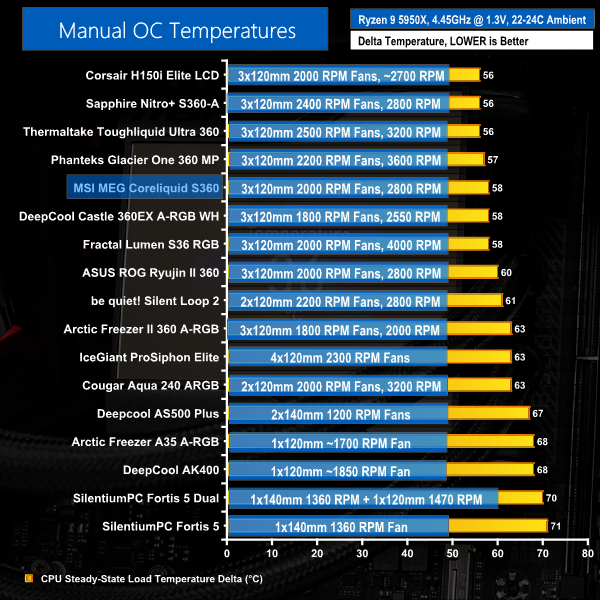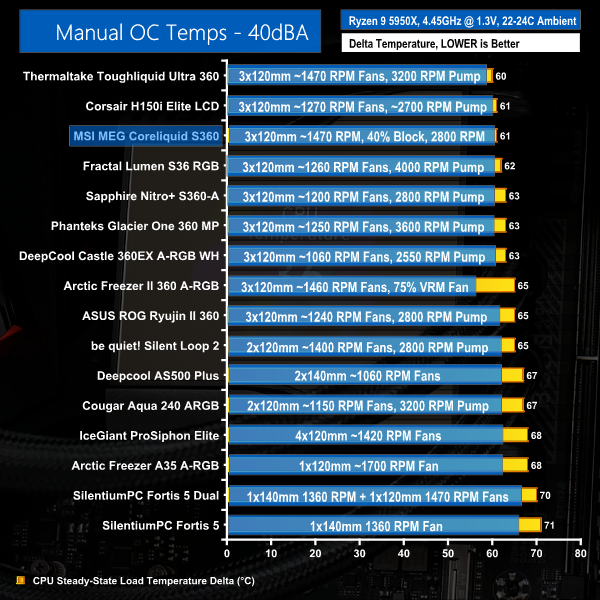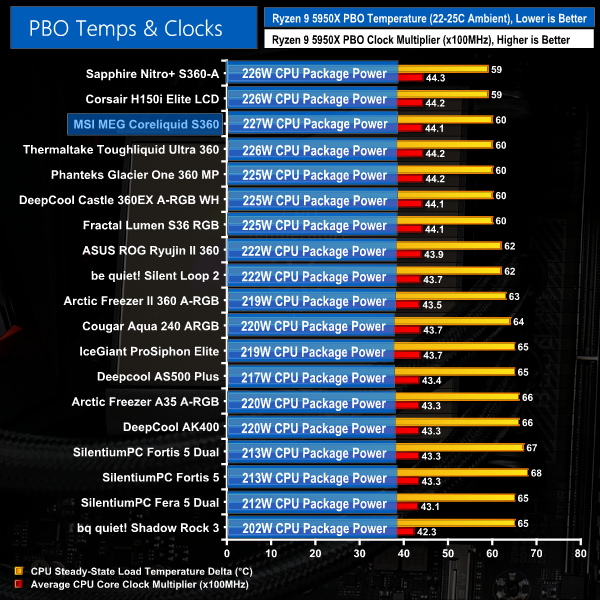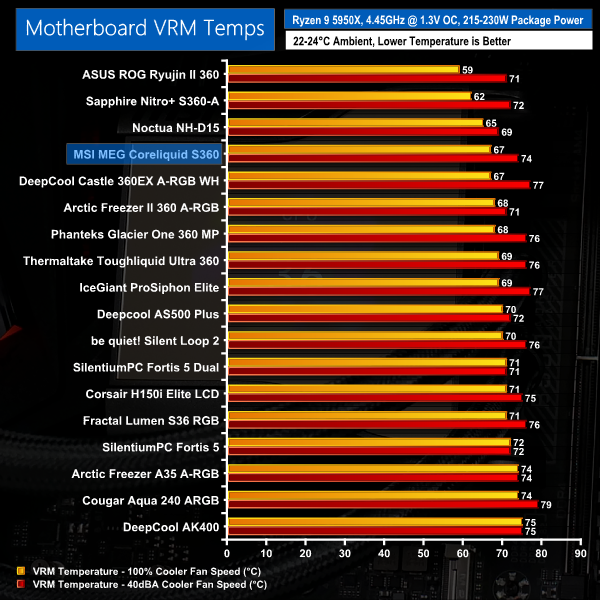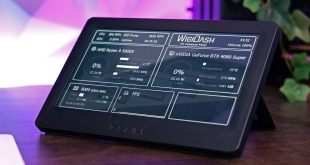Test System:
- Processor: AMD Ryzen 9 5950X
- Overclocked Settings: 4.45GHz all-core @ 1.312V (UEFI), Medium LLC – around 1.3V delivered
- Motherboard: Gigabyte B550 Aorus Master
- Memory: 32GB (2x16GB) Corsair Vengeance LPX 3600MHz 16-18-18-36 DDR4 @ 1.35V
- Graphics Card: Gigabyte RTX 2060 Super 0dB Mode
- Chassis: Fractal Design Meshify 2
- Chassis Fans: 2x140mm 1000 RPM Fractal Front Intake, 1x140mm 1000 RPM Fractal Rear Exhaust, 1x140mm 1000 RPM be quiet! Pure Wings 2 Roof Exhaust (for air cooler testing)
- Power Supply: Seasonic Prime TX-1000
- Operating System: Windows 10 Pro 64-bit
Testing Methodology:
- For testing, we use a 30-minute looped run of Cinebench R23 and record the steady-state CPU temperature at the end of the test. This ensures that the CPU has had ample time to warm up and reach steady state under all of the coolers.
- Ambient is maintained around 22-24 degrees Celsius. Where there is variation beyond this temperature range, we add in extra repeated tests to ensure consistency.
- We also test each cooler with at least two fresh installs (typically three) to mitigate the likelihood of a dodgy mount spoiling results.
Test Results:
Acoustics
Let’s start off with noise performance at 100% fan speed. This is important for getting an indication of where our performance expectations should lie based on noise output.
Running at 50 dBA in our test system, noise output from the MSI MEG Coreliquid S360 is about where would expect for a high-end, 360mm, Asetek-build AIO liquid cooler.
The notable Corsair and Thermaltake 360mm, screen-equipped competitors are both at similar noise levels, despite MSI running slower – 2000 RPM – fans versus the Toughliquid Ultra 360. But MSI does also have that 60mm waterblock fan running at 4000 RPM top speed, so 50 dBA total output is absolutely fine, on balance.
You get reasonable fan speed curve control in MSI’s software too, so that can allow better tailoring of noise output.
In order to get the unit running at 40 dBA, we had to restrict the radiator fans down to 70% duty cycle which translates to around 1470 RPM operating speed.
As MSI’s software only permits for the fourth point on the radiator fan curve to go as low a 70% fan speed for 81C recorded temperature, we realistically had no room to further reduce the radiator fan speeds for our testing methodology. This was an issue because the noise output was still above our 40 dBA necessitated target level.
As such, we were forced to also reduce the waterblock fan speed to hit our target noise output. This was reduced to 40% duty cycle which recorded as around 2050 RPM according to the MSI software. The pump was maintained at its 2800 RPM maximum speed output.
Thermal Performance
Overclocked temperature performance from MSI’s cooler is strong, in isolation. A delta temperature of 58C is a good result and is comparable to some of the other 360mm coolers in our chart – albeit the more cost-effective ones.
However, MSI’s performance versus its logical market positioning and cost competitors – the Corsair H150i Elite LCD and Thermaltake Toughliquid Ultra 360 – is less flattering. Both of those competing coolers offer slightly better performance than MSI’s MEG Coreliquid S360. And as our previous chart showed, both coolers also run at very similar noise levels.
That’s not a great result for MSI, so we will have to see how the fans are able to maintain their performance versus the competition when locked to 40 dBA.
Noise efficiency looks to be a strength for the MSI MEG Coreliquid S360, as indicated by the 40 dBA locked performance result.
Here, we see the cooler putting in a 61C delta, which is only a 3C reduction in performance versus the full fan speeds. And now, we see very competitive performance from MSI versus the Thermaltake LCD-equipped competitor and only a slight deficit versus Corsair’s alternative.
As always, it is critical to note that small difference in the displayed delta temperatures are not as important for our PBO testing because the clock speed and cooling power achieved are more important metrics.
Precision Boost Overdrive performance from the MSI MEG Coreliquid S360 is very positive. We see cooling performance that matches the Thermaltake Toughliquid Ultra 360 competitor and manages a slightly better CPU power dissipation value, albeit at marginally lower all-core clocks. And only the Corsair and Sapphire 360mm AIOs are better than MSI’s by a very small – almost insignificant – margin.
227W of package power handled is a very good result and shows that MSI’s unit does have strong cooling abilities at particularly high thermal loads.
VRM cooling performance is solid thanks to the inclusion of MSI’s 4000 RPM, 60mm waterblock fan. With that said, I did expect a bigger improvement versus some of the 360mm competitors, particularly when the other 60mm-fan-equipped, Asetek-built unit – ASUS’ ROG Ryujin II 360 – offers so much better VRM cooling.
Either way, we don’t have complaints with the incidental VRM cooling from MSI’s unit. It’s just that the noise penalty of the waterblock fan is probably not worth as much performance gain as we’d have liked.
Be sure to check out our sponsors store EKWB here
 KitGuru KitGuru.net – Tech News | Hardware News | Hardware Reviews | IOS | Mobile | Gaming | Graphics Cards
KitGuru KitGuru.net – Tech News | Hardware News | Hardware Reviews | IOS | Mobile | Gaming | Graphics Cards


